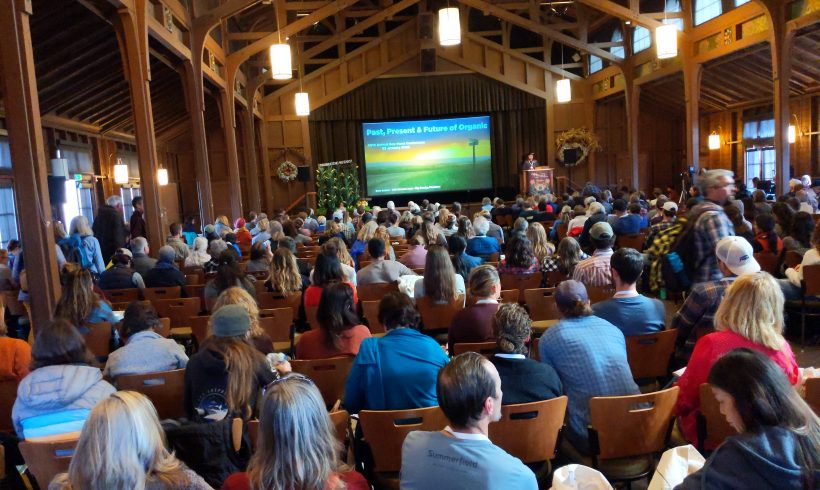It’s been about a month since the Terra Cultura staff ventured to Asilomar Conference Grounds in Pacific Grove for the annual EcoFarm Conference. The Conference is put on by The Ecological Farming Association — a non-profit educational organization whose mission is to nurture safe, healthy, just, and ecologically sustainable farms, food systems, and communities by bringing people together for education, alliance building, advocacy, and celebration. We’ve been so busy on the farm that it took us a while to compile our notes for a report on our conference experience. But better late than never! Here are some key takeaways from each of us:

Jessica:
My day started off with the workshop ‘History of California Native Peoples and Good Allyship’. It’s always a pleasure to hear Kanyon Sayers-Roods speak, and this time she was joined by the eloquent Gregg Castro as well. Much knowledge was shared with us in a very short amount of time, but there were a couple highlights that especially resonated with me. The first was the importance of building a relationship with the land, and that in order to truly know it, you need to experience it. Our relationship with the land is something we need to be renewing daily, through touch, through getting our hands in the soil. Only then can we understand the land, and hear its needs. Only then can we ask it permission to be here.
The other highlight was the necessity to shift our ways of thinking from the individual to the communal. According to Castro, in indigenous languages, there aren’t many words for ‘I’, but there are many words for ‘we’. The emphasis is and has always been on the community. If we are going to succeed in our fight for decolonization, we need to push back against the individualistic settler mindset that is so pervasive in our current society. We need to come together, as a community, to change the narrative, to decolonize our minds and the spaces we exist in. There is strength in numbers.
I’m grateful that I get to work with an organization like Terra Cultura, that gives people opportunities to build relationships with the land and each other, and strengthens the communities that are essential if we are going to create a more just future.
Travis:
The “Cover Crop Selection Tips” workshop provided me with a lot of invaluable information to mull over. It was very useful to see what practices other farms similar to ours are employing to get the most utility out of their winter covers. Two of the presenters work on farms close to our home here in Aromas, so the crops they chose are the same ones we’re using this winter on our fields. I hadn’t realized before this workshop that the timing of the termination of our cover crop plays such a vital role in determining how much of each nutrient can then be reabsorbed by the soil. This workshop felt like a great example of vital knowledge transfer from larger, more established farms, to smaller burgeoning farms like Terra Cultura.
Rachel:
My EcoFarm experience involved a survey of the history of Women and Sacred Plants (The workshop was aptly titled Doctor, Destroyer, Diviner, Delighter), listening to incredibly moving stories from Corine Pearce, a Pomo basket weaver from Redwood Valley, CA, learning about the practices of a Biodynamic farm in Watsonville, CA, and madly taking notes during a very detailed and technical session on fruit trees. It is affirming to hear the repetition of the ancient wisdom that we are always seeking to integrate at Terra Cultura: our relationship with the land is a reciprocal partnership in which we are caretakers of each other. Pearce said, “When we say we own an oak tree, it’s like saying I own my mother. No one would deny that it’s true, she’s my mother, but also I can’t control her. She takes care of me and I take care of her.” And Pearce would know, her ancestors have been processing acorns in Redwood Valley for 28,000 years.
Presenters and conversations during EcoFarm have me reflecting on how difficult it is to build trust and intersectionality amidst the devastating and very present effects of colonialism, slavery, violence, and white supremacy in this country. Farmers have a unique opportunity to be leaders and allies in their communities. We have a responsibility to work to dismantle exploitive, oppressive systems and to work to build more just, equitable, and sustainable systems in their place. After all, we produce something as economically, socially, and culturally essential as food; and we understand that healthy ecological systems cannot be separated from healthy social systems.
An important aspect of EcoFarm is networking and alliance-building. This year at EcoFarm, the Terra Cultura staff met with other organizers to discuss how we can create a local farmer network to better collaborate, support one another, and advocate for a more just food system. We’re very excited to see where these conversations lead, and we’re grateful to have the opportunity to participate in these dialogues.
